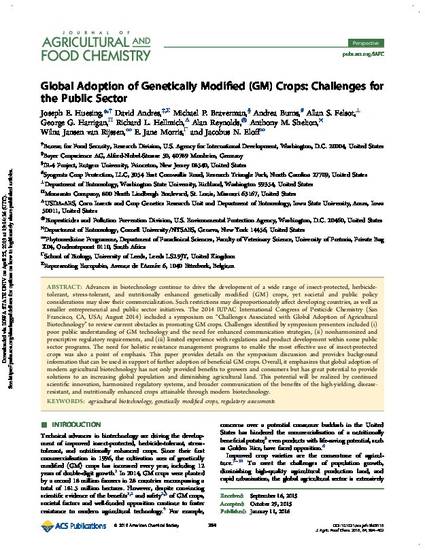
Advances in biotechnology continue to drive the development of a wide range of insect-protected, herbicide-tolerant, stress-tolerant, and nutritionally enhanced genetically modified (GM) crops, yet societal and public policy considerations may slow their commercialization. Such restrictions may disproportionately affect developing countries, as well as smaller entrepreneurial and public sector initiatives. The 2014 IUPAC International Congress of Pesticide Chemistry (San Francisco, CA, USA; August 2014) included a symposium on “Challenges Associated with Global Adoption of Agricultural Biotechnology” to review current obstacles in promoting GM crops. Challenges identified by symposium presenters included (i) poor public understanding of GM technology and the need for enhanced communication strategies, (ii) nonharmonized and prescriptive regulatory requirements, and (iii) limited experience with regulations and product development within some public sector programs. The need for holistic resistance management programs to enable the most effective use of insect-protected crops was also a point of emphasis. This paper provides details on the symposium discussion and provides background information that can be used in support of further adoption of beneficial GM crops. Overall, it emphasizes that global adoption of modern agricultural biotechnology has not only provided benefits to growers and consumers but has great potential to provide solutions to an increasing global population and diminishing agricultural land. This potential will be realized by continued scientific innovation, harmonized regulatory systems, and broader communication of the benefits of the high-yielding, disease-resistant, and nutritionally enhanced crops attainable through modern biotechnology.
Available at: http://works.bepress.com/richard_hellmich/195/

This article is published as Huesing, Joseph E., David Andres, Michael P. Braverman, Andrea Burns, Allan S. Felsot, George G. Harrigan, Richard L. Hellmich et al. "Global adoption of genetically modified (GM) crops: challenges for the public sector." Journal of agricultural and food chemistry 64, no. 2 (2016): 394-402. doi: 10.1021/acs.jafc.5b05116.